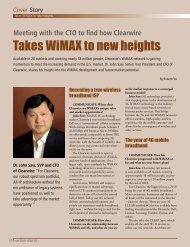EMOBILE: the mobile broadband revolutionist - Huawei
EMOBILE: the mobile broadband revolutionist - Huawei
EMOBILE: the mobile broadband revolutionist - Huawei
You also want an ePaper? Increase the reach of your titles
YUMPU automatically turns print PDFs into web optimized ePapers that Google loves.
Tao of Business<br />
Inspiration from<br />
Internet business models<br />
Internet reinforces its leading position with a growing penetration rate and fast-increasing<br />
user base. Can telecom operators transplant <strong>the</strong> Internet-related technologies and successful business<br />
models, so as to find a new profit stream?<br />
By Chen Fudong<br />
Land of opportunity<br />
or a black hole?<br />
As is known to all, <strong>the</strong> predecessor<br />
of <strong>the</strong> global Internet was <strong>the</strong><br />
Advanced Research Projects<br />
Agency Network (ARPANET)<br />
developed by <strong>the</strong> United States<br />
Department of Defense in<br />
1969. In1990, <strong>the</strong> hyper text<br />
protocols of Tim Berners-Lee and Robert Cailliau allowed<br />
<strong>the</strong> technology and application to swiftly morph into<br />
<strong>the</strong> world wide web of today. In less than 40 years, <strong>the</strong><br />
Internet has grown from <strong>the</strong> original four nodes to around<br />
400 million nodes, with over a billion users. This can be<br />
attributed to <strong>the</strong> web breaking out of <strong>the</strong> circle of science<br />
and research and being easily accessible to ordinary users<br />
and geeks alike.<br />
Along with constant expansion, network performance<br />
has also consistently improved through software hardening<br />
(which uses hardware devices to replace software modules<br />
for packet forwarding). A number of new stars have been<br />
born.<br />
We can see <strong>the</strong> shining stars as well as <strong>the</strong> dark side<br />
in <strong>the</strong> course of Internet innovation. In reality, <strong>the</strong>re<br />
are far more losers than winners. Microsoft is a vivid<br />
example. They have invested heavily in Internet services<br />
including: Internet Explorer, MSN, Hotmail, MSNM,<br />
Live, Space, and Facebook among o<strong>the</strong>rs. Their assets<br />
span <strong>the</strong> industrial chain upstream and downstream,<br />
from television (MSNBC) to consumer electronics (Xbox<br />
360). Never<strong>the</strong>less, <strong>the</strong> return on <strong>the</strong> Internet investment<br />
is nothing to crow about. It is obvious that, even for<br />
Microsoft it is difficult to succeed in <strong>the</strong> Internet.<br />
Transitions of Internet business<br />
models<br />
The earliest mass commercialization was <strong>the</strong> ISP era<br />
represented by AOL, and <strong>the</strong> business model was to bill<br />
dialup subscribers by usage or by <strong>the</strong> hour. Later, <strong>the</strong><br />
Internet entered <strong>the</strong> portal era as represented by Yahoo!,<br />
and it gained revenues from display ads based on <strong>the</strong><br />
number of clicks and views by users. The value of an ad<br />
depended on <strong>the</strong> popularity or amount of traffic on <strong>the</strong><br />
site.<br />
Then Google exploded onto <strong>the</strong> scene and led <strong>the</strong><br />
search engine era and <strong>the</strong> successful model became<br />
targeted advertising. The value of this type of advertising<br />
lies in accurately steering <strong>the</strong> user to commercial sites he/<br />
she might have interest in making purchase forms.<br />
The current era is represented by social networking<br />
sites such as Facebook and <strong>the</strong> business model shifts to<br />
recommended advertising. The value lies in word of mouth<br />
marketing, also known as viral marketing.<br />
The commercialization process progresses with how well<br />
<strong>the</strong> Internet understands people. In <strong>the</strong> era of <strong>the</strong> portals<br />
around 2000, subscribers were just contributors of traffic.<br />
A popular saying was, “On <strong>the</strong> Internet, nobody knows<br />
you’re a dog”. The era of search, however, was focused on<br />
FEB 2009 / Win-Win<br />
18

















